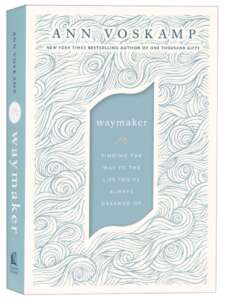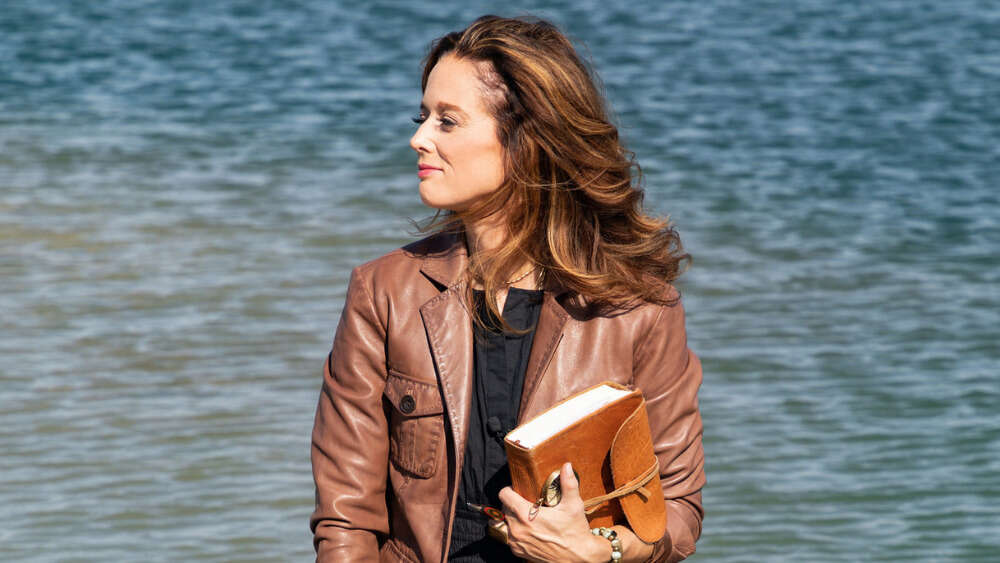Looking for a good read? Then tuck into this excerpt from Ann Voskamp’s latest book WayMaker: Finding the Way to the Life You’ve Always Dreamed of …
THE PLANS OF MICE AND NEWLYWEDS
As he drives toward the waves of the Great Lakes, I pull up just the hem of my wedding dress, the scalloped embroidery grass-stained from our backyard reception. I curl my bare feet up under me, turn a bit on the front seat of that Ford Taurus, and lay my head on his leg. He runs his big Dutch farming hands through my hair slowly, whispers it, the line of a song they used to play on the radio: “I think we’re alone now.”
He traces the nape of my neck.
“You couldn’t be more beautiful. I couldn’t be happier.”
I guffaw as he curls my hair around his fingers. Would we be the honeymooners who sleep close in islands of lunar light, like the lunatics who believe that dreams can last and never wane?
I can feel his gentle smile in the dark. And I must have closed my eyes only for a moment, but it’s enough to drift away into dreams of bringing home babies we never bury, and our parents aging into softly worn, silver-crowned glories who hold hands on front porch rockers while they hold the tiny humans our love has made. And the whole road ahead of us endlessly reroutes in our imaginations, avoiding head-on collisions with suffering, and we find ourselves in our own kind of promised land.
It’s my very first memory … standing beside Mama as she screamed bloody horror, watching as an oblivious service truck driver struck down our little Aimee …
My own mama, she had four children, four and under, and she held her swaddled three-week-old babe in her arms when she stood over an open grave to bury her two-year-old daughter. It’s my very first memory, just after my fourth birthday—standing beside Mama as she screamed bloody horror, watching as an oblivious service truck driver struck down our little Aimee, crushing her in our farmyard right outside the kitchen window as we washed dishes at the sink, and then blithely driving on out our lane. How can a delivery driver not feel the wholeness of your child under the tires of his truck when she holds your whole heart?
My mother-in-law, she’d stood over two of her children’s graves, burying first her four-year-old son with different abilities, to whom she had been a 24/7 primary caregiver. Then only six years later her firstborn, her seventeen-year-old son, pulled out directly in front of a truck he couldn’t see in the blinding blaze of a glorious Friday evening sunset, on his way to a church youth group meeting. He’d been a mere two miles from home. She buried him on a Tuesday afternoon, then came home with her six younger children to get dinner on the table before they all had to go to the barn for the six p.m. milking of the cows.
If she stated it once, my mother-in-law told me literally two hundred times: “Three things.” She held up her thick fingers over the bean leaves, her plain gold wedding band wearing a pressed red ring right into her skin. I was a gangly, spectacled kid of seventeen, dating her boy, the youngest of her nine, and she and I were out in her kitchen garden, both hunched over a row of yellow string beans, heaping our wooden baskets full.
“There were only three things I was certain about when I was twenty years old: I never wanted to marry a farmer. I never wanted to leave the Netherlands. I never wanted to have a big family.”
She stood up, straightened in a patch of lazing sun. Said it slow, so I wouldn’t miss the summary of her life story: “And? I ended up marrying a farmer. I left my home country—my mother, my family—the day after I married. And then I had nine kids—and ended up burying two.”
Detours are the way dreams and destinies actually come true.
She was still standing.
Still standing in the beans. Still standing, softened and worn into the beauty of real, after nothing turned out the way she had dreamed for the only life she would ever have. What was she trying to tell me? Was this strong Dutch woman in an apron asking for pity? Doubtful. She may have been trying to tell me: Detours are the way dreams and destinies actually come true.
The destiny we all ultimately dream of is a destination where we are ultimately seen, safe, soothed, and secure. Even nightmares of loss and tragedy and grief can still become an unexpected awakening to tender dreams, if there are ways—even in the dark places—to be seen and known, safe and secure. Dreams are brave laughter that lingers long into the night, hands finding ours, warming light finding our faces—and the possibility of being known even here grows our hearts achingly large. Wherever we are always accepted and never alone, never abandoned, our deepest dreams can come true—even in the midst of nightmares. I had high hopes of waking to a dream different from both of our mothers’. No graves. No slammed doors or cold wars, no lightning-bolt diagnosis or stalking depression, no abandonment or estrangement, no cascading job loss or piling bills or empty arms. No trauma from the straight-out-of-nowhere tragedy, the unlikely addictions, the turned distractions, the knife-in-the- back betrayal, the flat-out rejection, or the entirely suffocating personal failure you can’t escape because you can’t escape out of your own skin. Why do we think that our life will be the one that finds a way to easier roads? Why in the world did I? It’s when we expect life to be easy that it becomes hard.
Buy the lie that your life is supposed to be heaven on earth, and suffering can be a torturous hell. But life is suffering, and suffering is but the cross we bear, part of earth’s topography to cross on our way to heaven. I wouldn’t know it for years: Screens sell pipe dreams. Every screen is trying to sell the lie to you— from Hollywood to Netflix to Instagram—the lie that all you have to do is buy this, work out like this, wear this, style it like this, believe this, pursue this, get a career like this, find someone like this, and you, too, can find the way to a perfect life, just like this. But buy any perfectly filtered and marketing-framed illusion, and you end up painfully disillusioned. Regardless of what Instagram or all the glossy ads are shilling, your suffering isn’t some unique anomaly; suffering is the universal experience of all humanity. Suffering doesn’t mean you’re cursed; suffering means you’re human. The question isn’t “Why is there suffering in my life?” but “Why wouldn’t there be suffering?” Because such is life in a broken world. The question is “What way will you bear your suffering?” I didn’t know it then, and I am still learning this now: Life is really hard because that is the reality of being alive. Life is hard in a thousand ways, and what comes the easiest to us is getting lost.
 Taken from WayMaker by Ann Voskamp Copyright © 2022 by Thomas Nelson. Used by permission of Thomas Nelson. www.thomasnelson.com.
Taken from WayMaker by Ann Voskamp Copyright © 2022 by Thomas Nelson. Used by permission of Thomas Nelson. www.thomasnelson.com.


